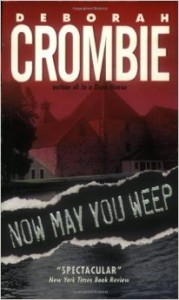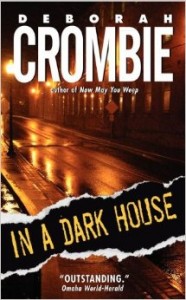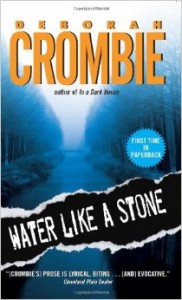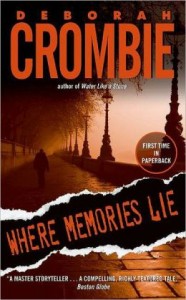 Now May You Weep
Now May You Weep
Gemma is invited by her friend and former landlord Hazel Cavendish to a “cookery weekend” in the Scottish Highlands at a bed and breakfast managed by one of Hazel’s old school friends and her husband. Little does Gemma know, however, that the whole event has been arranged to bring Hazel back to the area where she grew up so that she might reconnect and explore her connection with her first love, Donald Brodie. Meanwhile, back in London, Hazel’s husband Tim figures out what’s going on and resolves to do something about it.
The book begins slowly, introducing us to larger-than-life Scottish stereotype Donald and the other guests and lingering quite a while on the history of a pair of local distilleries. (Nothing will ever convince me that whiskey tastes good, and consequently I couldn’t get too interested in this aspect of the book.) Eventually, Donald is shot and killed at point-blank range and Gemma must watch from the outside as a local Detective Chief Inspector takes charge of the case and doesn’t avail himself of her assistance. Of course, she gets involved anyway.
Now May You Weep is a decent book. I didn’t guess the culprit, but I thought some aspects of the conclusion were a bit far-fetched. Revelations that might’ve had impact somehow did not. Too, I was saddened that an element of the supernatural has crept back into this series in the form of Hazel having dreams about her great-grandmother that lead her to uncover the truth behind the feud that kept Donald’s father from approving of their long-ago engagement.
Still, it was sufficiently enjoyable that my enthusiasm for the series remains undimmed.
 In a Dark House
In a Dark House
These columns sometimes take a long time to complete, as exemplified by the fact that over 2.5 years have passed since I finished Now May You Weep. In the interim, I got obsessed with podcasts, but my book fervor has returned and, man, was I ever in the mood for some Deborah Crombie. Thankfully, In a Dark House is very good.
When a body is found in a burned warehouse owned by a prominent politician, Duncan is assigned to investigate. Meanwhile Gemma, traumatized by recently having failed to find a missing child, learns about a missing woman who lived nearby. Could she be the unidentified victim of the fire? But wait, here are two more missing women and a kid, to boot. Of course, everything ends up being related, and past a certain point, some of it was kind of predictable, but it was also satisfying.
I enjoyed spending more time with Duncan’s new Sergeant, Doug Cullen, as well as the introduction of Maura Bell, the local inspector who should’ve had the case before Duncan turned up. I hope to see more of them both in future installments. I continue to love Gemma, and loved that she was able to regain some confidence with this case. I loved that we saw Duncan being kind of an ass a few times, and how there are some unresolved things between them at the end of the book. I also loved that one suspect’s desperate actions due to custody arrangements eventually prompted Duncan to realize there wasn’t anything he wouldn’t do to keep his son, Kit, with him.
I didn’t love that it was super obvious that the case was going to prevent Duncan from making it to Kit’s custody hearing on time. It’s one of those things where you wish you could shake a fictional character. Gemma yelled at him, but not enough, I thought, and then started feeling she’d said too much. It was all very frustrating. I also thought Crombie tipped her hand with one specific character, who gave me suspicious feels the moment they were first introduced. Still, on the whole, I enjoyed this book quite a lot and vow to not let so much time elapse before the next one.
 Water Like a Stone
Water Like a Stone
It was only 1.5 years between books this time. Progress!
It’s Christmas, and Duncan, Gemma, the boys, and the dogs have all made the trip to the cozy town of Nantwich to stay with Duncan’s family for the holidays. On the night of their arrival, however, Duncan’s sister Juliet discovers the entombed body of an infant while working on renovating an old barn for some clients. Meanwhile, she’s contending with her atrocious husband who believes what his slimy business partner has been telling him about Juliet, namely that she’s been unfaithful. Actually, until about the 75% mark, most of Duncan and Gemma’s part of the story is just accessory to family drama, as Juliet’s troubled teen daughter Lally also figures prominently.
That makes sense, of course, since Scotland Yard has not officially been called in to assist with the case. And, happily, the investigative team from Cheshire CID (and here I also include the pathologist) are extremely well drawn and enjoyable characters. I liked them so much, in fact, that if I learned Deborah Crombie was going to start a spinoff series focusing on them, I’d be ecstatic. Before long, another person is murdered, and then we wait for the detectives to put everything together.
I want to emphasize the “we wait” part, because my one major complaint about this book is that the solution to the mystery is pretty easy to guess. Granted, it took me longer than it should have to realize what had happened with the infant in the barn, but the identity of the character whose anonymous and deranged (cruelty to animals warning!) point-of-view we occasionally access was quickly obvious, and I knew that the sporadic mentions of a teenager’s death by drowning one month prior were going to pay off eventually. I still enjoyed the book very much despite this, though!
 Where Memories Lie
Where Memories Lie
Erika Rosenthal, Gemma’s friend, came to England fleeing Nazi Germany. Her father, a jeweler, stayed behind but gifted her his latest creation, an exquisite diamond brooch, though this was stolen before Erika even made it out of Germany. Now it has turned up for auction in London and Erika has asked Gemma to investigate the matter. The day after Gemma makes her inquiries at the auction house, the employee she spoke to is intentionally run down by a Land Rover while crossing the street on her way home. Convinced this has something to do with the brooch, Gemma prevails upon Kincaid to take the case.
As Gemma and Kincaid work the case in the present—assisted by Doug Cullen and Melody Talbot, whose points-of-view I was glad to see, even though Doug is bitter and abrasive—a parallel investigation unfolds in 1952 involving the murder of David Rosenthal, Erika’s husband. I don’t know whether I’ve read too many mysteries in general or too much Crombie in particular, but I found the solution in both cases even easier to guess than in Water Like a Stone. The three chief suspects in the present each appear so thoroughly innocent that one starts to look at background characters. Who could it be that we’ve seen enough for it to be a satisfying solution? Really, there was only one person and from there the whole motive unfurled.
That said, I still really like the characters in this series, particularly Gemma. I’m also glad we got to know so much more about Erika. As the novel begins, Erika’s daily struggle is described as “the balancing of each day’s small, luminous joys against the ever-threatening beast of despair” but Gemma’s efforts afford her not only closure regarding what happened to David but also another lost romantic opportunity, initially “too painful to contemplate even now.” By the end of the novel, Erika seems to be opening herself up to the possibility of love again, and I hope she’s able to find some happiness. The great thing about Crombie is that she’ll be sure to keep us updated—I’m still super grateful she’s never forgotten the cat Duncan adopted in, like, book two.
Leave a Reply